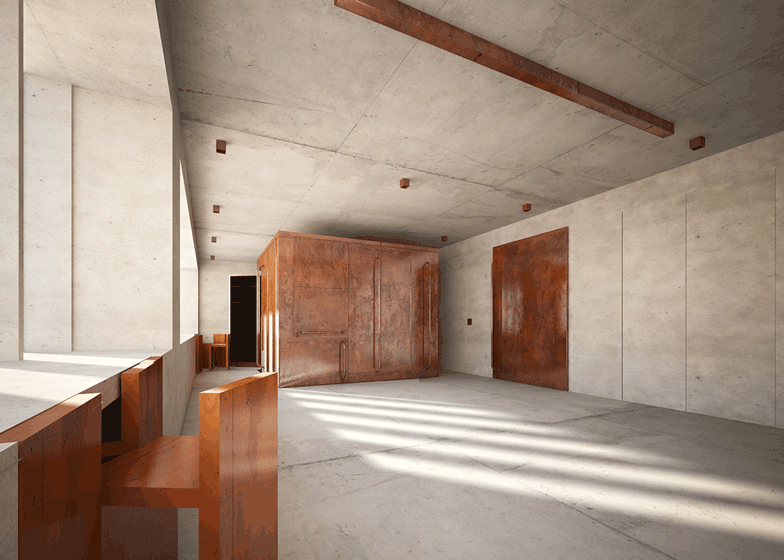A copper-clad box for storing, exhibiting and selling paintings will stand in the centre of this Hong Kong apartment, designed by Penda for one of China's biggest art collectors (+ slideshow).
The collector asked the studio run by architects Dayong Sun and Chris Precht to convert the 200-square-metre apartment in a Hong Kong tower into a space not to live, but to store and sell paintings.
"The client is one of the largest art collectors in China," Precht told Dezeen. "And Hong Kong is the largest market for art in China."
"The space is purely for art and for his collection. Showing and selling. But not living," he continued. "The space is not frequently used and is basically there to store the artworks, and occasionally invite some clients to review some paintings."
Copper-covered hatches, doors and an oversized drawer will unfurl from a large cube to reveal valuable artworks, and an upholstered bar area where the collector can entertain potential buyers.
A chunky desk, shelves and sofas will hinge out from the box to allow guests to appreciate views over city through the row of large windows, which runs along one side of the apartment.
Each component can be pulled or pushed back into place with a long tubular handle made from matching patinated copper.
"Our design is a transformable box, which reacts to the infrequent usage of the space," said Precht. "Given the program of an infrequently used space, we are introducing a suitcase-like box made out of matt-reflecting copper panels."
"The box can be fully opened and integrated in the space; thus, after the paintings are shown, the box can be fully folded up to secure the artwork when the space is unoccupied."
The raw concrete space surrounding the box will remain unaltered, with just a row of copper stools to be tucked beneath the window sill. Small box-shaped light fittings and doors made from copper will also dress the space.
The studio hopes this sparsity will add to the intrigue of the copper box and its reflective surfaces.
"Leaving the rest of the space in untouched rough concrete, the copper objects capture attention, reflecting natural light in a warm, red tone," explained the studio.
Construction is scheduled to start in February, following the Chinese new year.
Penda was founded by Sun and Precht in 2013, and has offices in Vienna and Beijing. The studio recently unveiled a modular bamboo housing system and its plans for a plant-covered tower in Vijayawada, India.
Images are courtesy of Penda.
Project credits:
Architects: Penda
Project team: Chris Precht, Sun Dayong, Bai Xue, Quan He, Li Pengchong

